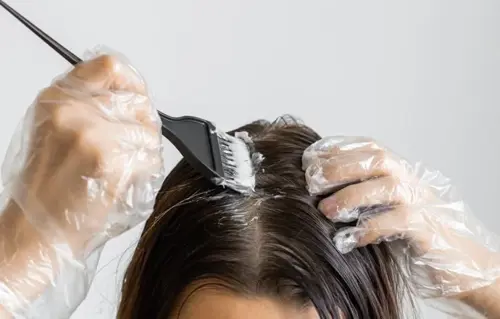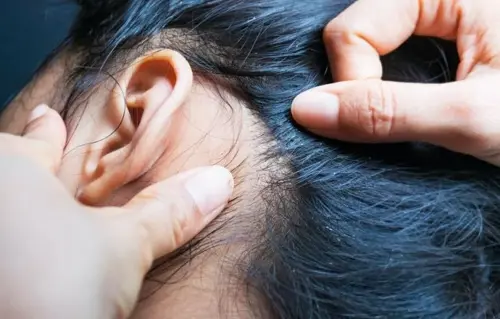ITCHY SCALP: WHEN IT’S NOT JUST DANDRUFF
What causes an itchy scalp? That’s the million-dollar question. Whether you’re seeking relief from an irritated scalp or it’s a more severe case, there are many different factors to take into consideration when trying to discover the right itchy scalp treatments. So before you go Googling “home remedies for an itchy scalp,” figure out what’s causing it first.
Sometimes itching and inflammation can be brought on by something other than dandruff. Excessive itching can give rise to root damage in the long term which can potentially cause hair loss, so it’s important to figure out what’s triggering it and find the right treatment. Whatever the trigger, an itchy scalp can be a big distraction from everyday life and create unnecessary stress, so it’s important to treat it as soon as possible.
Read on to discover the most common reasons for an itchy scalp and how to relieve the itching.

Hives
Hives can form anywhere on the body and usually look like red, raised bumps that are very itchy. Triggers for hives include food, plants, chemicals, dust mites and even stress. Although hives tend to come and go on their own and usually only last a couple of hours, they can be very itchy.
How to relieve hive itching:
Antihistamines are used to treat hives and can be obtained from your pharmacist. They work by blocking the effects of histamines to alleviate the rash, which offers some itchy scalp relief.
Atopic dermatitis
Categorised as a type of eczema, atopic dermatitis can develop on the scalp causing itching, redness and scaly skin. Itching is the main symptom of atopic dermatitis, a condition affecting 11 – 20% of children and 5 - 10% of adults in the UK every day. Atopic dermatitis on the scalp can cause flaking of the skin when it’s been scratched which can mimic the appearance of dandruff.
How to relieve atopic dermatitis/ eczema itching:
Atopic dermatitis can be managed through a healthy diet and maintaining a healthy sleep pattern, as well as avoiding stress. People with atopic dermatitis need to keep their skin moisturised because dry skin could increase itching. Doctors may prescribe creams and itchy scalp treatment products such as topical steroids, to alleviate the affects of atopic dermatitis, including itching.
Allergic reaction
An allergic reaction to hair care products can cause the scalp to become very itchy and uncomfortable. Common ingredients in hair dye, such as para-phenylenediamine can sometimes cause allergic reactions so that the scalp becomes red and itchy.
How to relieve itching from an allergic reaction:
Again, if you’re wondering why is my scalp so itchy? The cause could be the products you’re already using. Stop using products that result in an itchy or burnt scalp immediately to prevent further damage to the skin. If the cause of the reaction is unknown you will need to find the source to stop the reaction. It might be worth getting referred to a dermatologist for further help.

Head lice
Although head lice are more commonly found in school children, adults are not immune to catching them. A tell-tale sign of having lice is itching. Head lice thrive in clean hair, so lice don’t necessarily indicate poor hygiene. Nit eggs can often look similar to dandruff flakes, which can be confusing.
How to relieve head lice itching:
Treat head lice as soon as they are spotted to stop the spread and transmission to other people. Lice can be removed by running a fine nit comb through wet hair. Alternatively, there are medicated lotions and sprays available to kill the lice before they are removed with a nit comb. Speak with a pharmacist to find out more.
Psoriasis
Scalp psoriasis can cause dry, itchy and scaly rashes to occur. It’s often difficult to distinguish from eczema, but typically, scalp psoriasis is more commonly found around the nape of the neck, near the hairline. Just like other scalp skin conditions, psoriasis can cause itchiness on the scalp and cause discomfort for the sufferer.
How to relieve psoriasis itching:
Doctors can offer treatments for an itchy scalp caused by psoriasis. Treatments might include a coal-tar based shampoo or scalp application. Similarly to eczema, psoriasis can also be treated with topical steroid creams.

How to treat dandruff
If the cause of your itchy scalp is dandruff, there’s no need to worry - it can be easily treated! First of all, dandruff can be identified as oily, large yellow or white flakes and the skin on the scalp may look oily, red and scaly. Dandruff can be treated with shampoos that contain active ingredients, such as ketoconazole which targets the root cause and not just the symptoms. Nizoral with ketoconazole targets Malassezia to treat dandruff and stop it from returning.
The best thing for an itchy scalp is to do your research! And reading this article is a great start. It’s also worth noting that an itchy scalp can be caused by a number of lifestyle factors such as stress, age and hormones.
We understand that scalp itching can be distressing and interrupt day-to-day life. Now we hope this article helped you narrow down the cause of itching so you can treat it appropriately, especially if you have a severe itchy scalp. And if you’re still a little unsure of your symptoms, consult a medical professional, such as your pharmacist or GP, for more advice.


